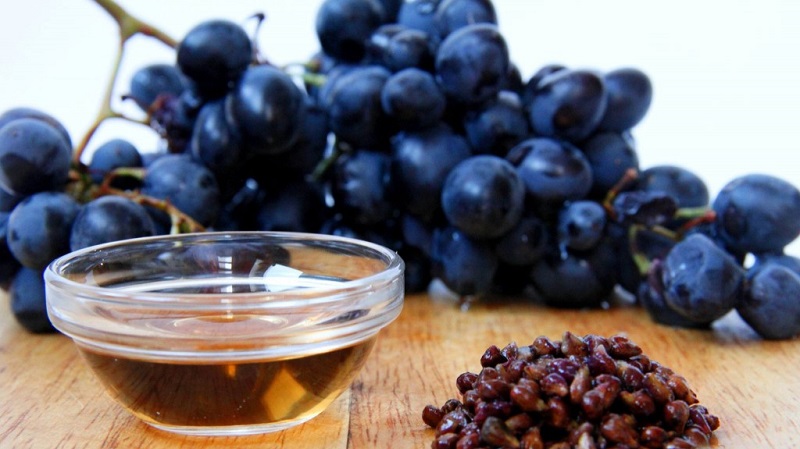Is it possible to eat grapes during pregnancy in the 1st, 2nd and 3rd trimester
Grape berries are beneficial for pregnant women due to their rich complex of vitamins and minerals. There is a separate direction based on the treatment with this fruit - ampelotherapy. Fruits strengthen the immunity of the expectant mother, heal the cardiovascular system, increase the level of hemoglobin and contribute to the formation of cells in the developing child.
The content of the article
Is it possible to eat grapes during pregnancy

Grapes are a storehouse of vitamins that are required daily for the body of a pregnant woman.
Berries contain:
- beta-carotene (provitamin A);
- ascorbic acid (vitamin C);
- alpha-tocopherol (E);
- niacin (PP);
- thiamine (B1);
- riboflavin (B2);
- choline (B4);
- pyridoxine (B6);
- folic acid (B9);
- phylloquinone (K);
- biotin;
- lutein and zeaxanthin.
Mineral composition:
- potassium;
- calcium;
- silicon;
- magnesium;
- phosphorus;
- boron;
- vanadium;
- iron;
- iodine;
- cobalt;
- manganese;
- copper, etc.
Grapes in large quantities contain:
- tartaric (tartaric) acid, which protects body cells from oxidation, increases skin elasticity, dilates blood vessels, tones up the cardiovascular, digestive and nervous systems;
- malic acid, which helps restore the immune system, improves iron absorption, blood circulation, intestinal motility, increases vascular tone, has antioxidant properties;
- phytoestrogens are plant compounds that promote the production and maintenance of estrogens (female sex hormones).
100 g of berries contain up to 6% of the daily intake of carbohydrates. The sweet and pleasant taste of grapes is given by fructose and glucose (20% and 74%, respectively), which have a high energy value and have a positive effect on the maintenance of the brain. In overripe fruits, the amount of fructose doubles.

In the early stages
Can grapes be pregnant in the early stages? It practically has no contraindications and has a positive effect on the woman's body:
- contributes to the adaptation of the body to the restructuring of hormonal levels;
- reduces the manifestations of toxicosis;
- increases resistance to stress;
- normalizes the work of the gastrointestinal tract;
- increases the level of hemoglobin.
In the second trimester
Moderate consumption of berries in the 2nd trimester in the absence of contraindications contributes to the normal development of pregnancy:
- reduces blood viscosity, which often rises due to the increasing load on the body;
- increases the elasticity of blood vessels and skin;
- strengthens the cardiovascular system;
- prevents constipation;
- strengthens the immune system.
Rubbing your face with freshly squeezed grape juice helps to remove age spots.
At a later date

In the last trimester of pregnancy, the use of grapes:
- relieves swelling by acting as a diuretic;
- normalizes the kidneys and urinary system;
- reduces emotional stress.
Doctors do not recommend eating grapes for women in the last month of pregnancy. By providing a firming and anti-inflammatory effect, phytoestrogens reduce the readiness for lactation.
Attention! For any, even minor manifestations of allergies (for example, redness or itching), it is important to stop eating grapes immediately, regardless of the gestational age.
Studies have found that eating foods rich in polyphenols (grapes, oranges, some herbal teas) in the 3rd trimester increases the risk of narrowing the ductus arteriosus in the fetus. In this case, the state is restored after restricting such food. Therefore, when choosing food, it is important to first consult with a specialist.
Benefit and harm

Grapes are high in antioxidants that destroy free radicals and inhibit cell oxidation. Berries prevent the development of various diseases, increase immunity and the body's resistance to stress.
However, excessive or untimely consumption of grapes in some cases leads to undesirable consequences and harms:
- provokes an increase in blood glucose levels;
- promotes inflammation of the gastrointestinal tract, the appearance of a feeling of heaviness, nausea and diarrhea;
- accelerates weight gain.
In the absence of contraindications and compliance with the consumption rate, it is almost impossible to get harm from the berries.
For mother
Black grapes tend to have a sour taste because they contain less sugars.
The safest to take during pregnancy:
- increases hemoglobin;
- strengthens connective tissue;
- strengthens the nervous system;
- lowers cholesterol levels;
- prevents the development of obesity;
- has a minimal load on the digestive system.
Red grapes contain polyphenols that:
- improve cerebral circulation;
- normalize the intestinal microflora;
- accelerate metabolism, thereby minimizing the negative manifestations of hormonal changes.
It is undesirable for women with a tendency to allergies to eat.

Green and white grape varieties:
- increase skin elasticity;
- have a diuretic effect, reduce the risk of developing urolithiasis;
- normalize the microflora of the oral cavity.
These grapes contain the highest amount of sugars, so overeating provokes excess weight gain and diarrhea.
Reference. The peel of the berries contains pectins, which cleanse the intestines from toxins and improve its performance.
The benefits of grape seeds:
- strengthens blood vessels;
- reduce the level of total cholesterol and LDL - low density lipoproteins;
- cleanse the intestines;
- normalize the hormonal system;
- prevent tooth decay.
Seeds are consumed only as a dietary supplement in the form of powder or meal. Before using, be sure to consult a doctor.

Grape seed oil:
- normalizes sleep;
- improves vision;
- lowers blood pressure, protects the heart;
- promotes the regeneration of skin cells;
- has anti-inflammatory and antimicrobial properties.
Contraindicated in diseases of the gastrointestinal tract, gallstone disease, condition after cholecystectomy.
Read also:
Is it possible to eat cabbage during pregnancy
Is it possible to eat sauerkraut during pregnancy and in what quantity
For a child
Benefits of grapes for a baby in the womb:
- provitamin A forms the optic nerves;
- phosphorus prevents genetic disorders;
- calcium and boron strengthen bones;
- potassium and sodium contribute to the formation of the nervous system.
It should be remembered that the consumption of sweet berries in large quantities provokes the appearance in the child of a tendency to obesity or diseases of the pancreas.
Contraindications
In what cases and why shouldn't grapes be consumed throughout pregnancy? Fruits are prohibited when:
- allergies;
- obesity;
- diabetes mellitus;
- stomach ulcer in the acute stage;
- chronic gastrointestinal diseases.
Terms of use

To get the benefits of grapes, it is important to follow certain rules:
- Eat fresh berries with the skin... The beneficial substances contained in the skins of grapes are concentrated, and fiber improves the activity of the digestive tract.
- The best time to consume is from 12 to 15 hours. The calories received during this period are completely expended on maintaining the body's energy balance.
- To avoid a spike in blood sugar do not eat berries for breakfast.
- Eating fruits at night is undesirable, since the digestive system does not work in full force in the evening and night hours, which will lead to stagnation and the appearance of fermentation in the intestines.
- Grape seeds in general, it is undesirable to eat, since they irritate the gastrointestinal mucosa, which leads to stomach diseases and increased gas production. Chewing the bones contributes to the destruction of tooth enamel.
It is recommended to use grapes in food only during the ripening season. Berries processed with preservatives cause intoxication, which causes irreparable harm not only to a pregnant woman, but also to her unborn child.
In what form is

The use of grapes for food is possible in several forms:
- Fresh fruits... In the absence of contraindications, this is a great way to saturate the body with vitamins. The consumption rate is 200-300 g per day, divided into 2-3 doses.
- Frozen grapes... In comparison with fresh, it contains less potassium and magnesium.
- Fresh juice... Minerals, vitamins, fructose and glucose are absorbed quickly and completely. The calorie content of 100 g of the drink is 80–180 kcal. Due to the large amount of sugars, the product quickly sours and begins to ferment. The consumption rate is no more than 250 ml per day.
- Packaged juice. In addition to natural sugars, it contains additional sweeteners and antioxidants. The recommended rate is 200 ml.

- Compote... During heat treatment, the amount of nutrients is significantly reduced, and the added sugar increases the calorie content of the drink.
- Raisins are dried berries. Contains 70-80% vitamins and 100% trace elements of fresh berries, but the concentration of sugars is increased 7-9 times. Calorie content 100 g - 280-340 kcal. Allowed to use no more than 80-100 g per day.
- Grape seeds. Contains essential oils, tannins and phytoestrogens. They increase immunity and normalize hormonal levels. It is recommended to use it in the form of a powder mixed in water, no more than 1 tsp. per day.
- Grape oil. Differs in a high content of polyunsaturated fatty acids (especially linoleic and oleic), vitamins A and E. It is used as an additive to salads in a limited amount - no more than 5-10 g per day.
How to choose and store berries

When buying grapes, it is important to pay attention to the following features:
- the bunch must be whole;
- berries should be of an even color, without dents or damage.
It is undesirable to use overripe fruits for food. Their main differences are the soft structure and the dry tip of the bunch. Consuming these grapes often leads to diarrhea.
The freshness of the grapes in the refrigerator is maintained for 7 days. It is advisable to eat the washed and scalded bunches of boiling water within 24 hours. For freezing berries at a temperature of -18 ... -20 ° C, a container or cling film is suitable. The shelf life in this form is 6–8 months.
Conclusion
For a pregnant woman, grapes are not only a berry with a unique taste, but also a source of many nutrients that are important for maintaining their own health and the formation of a child's body. Nutrients help maintain beauty and improve well-being.